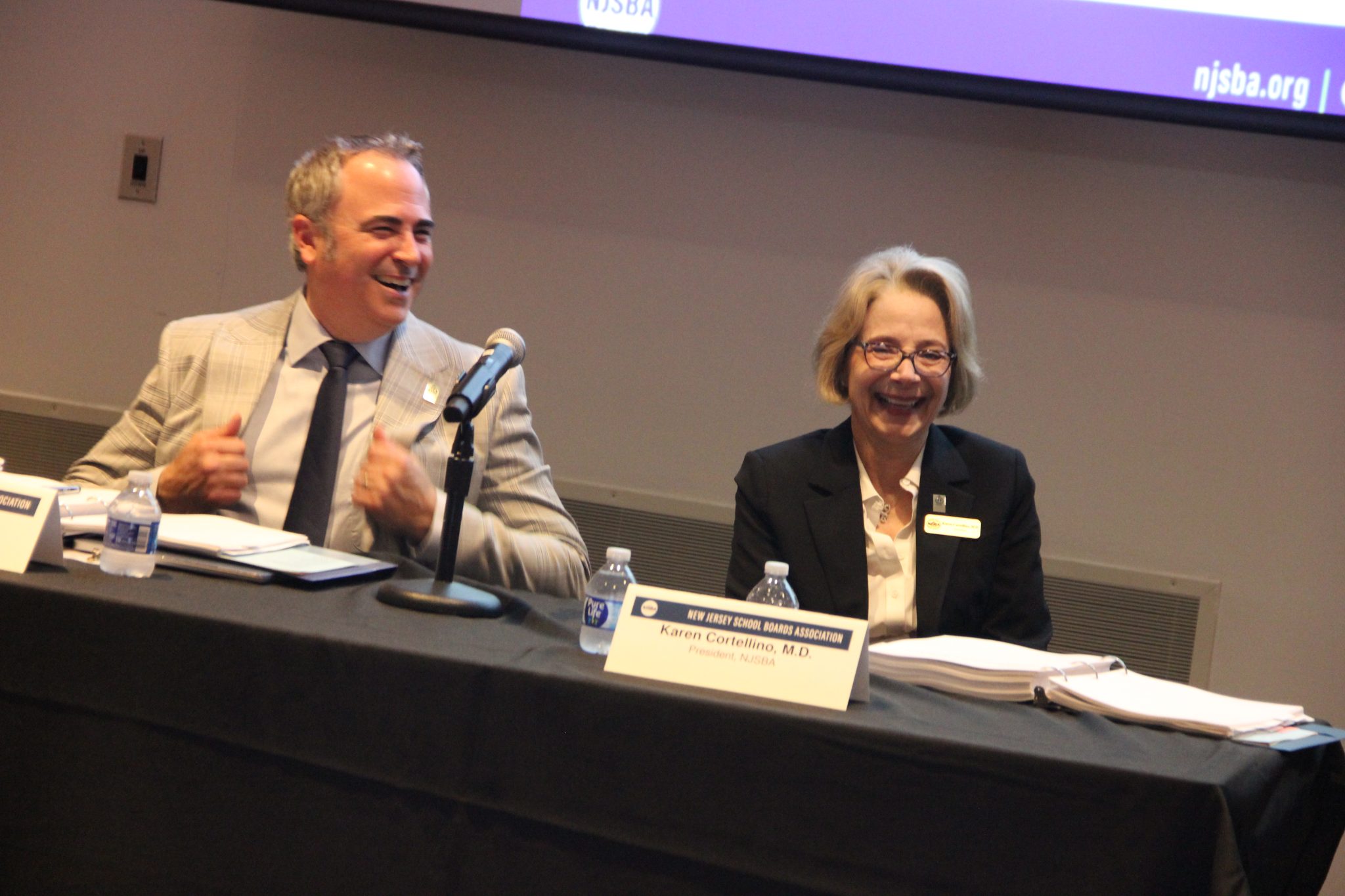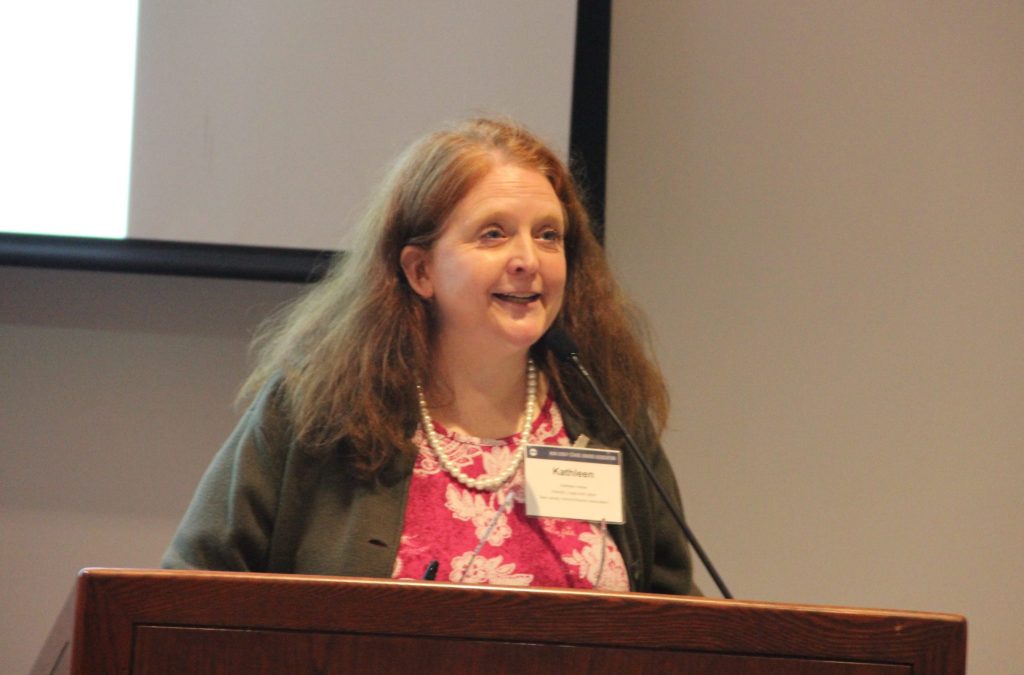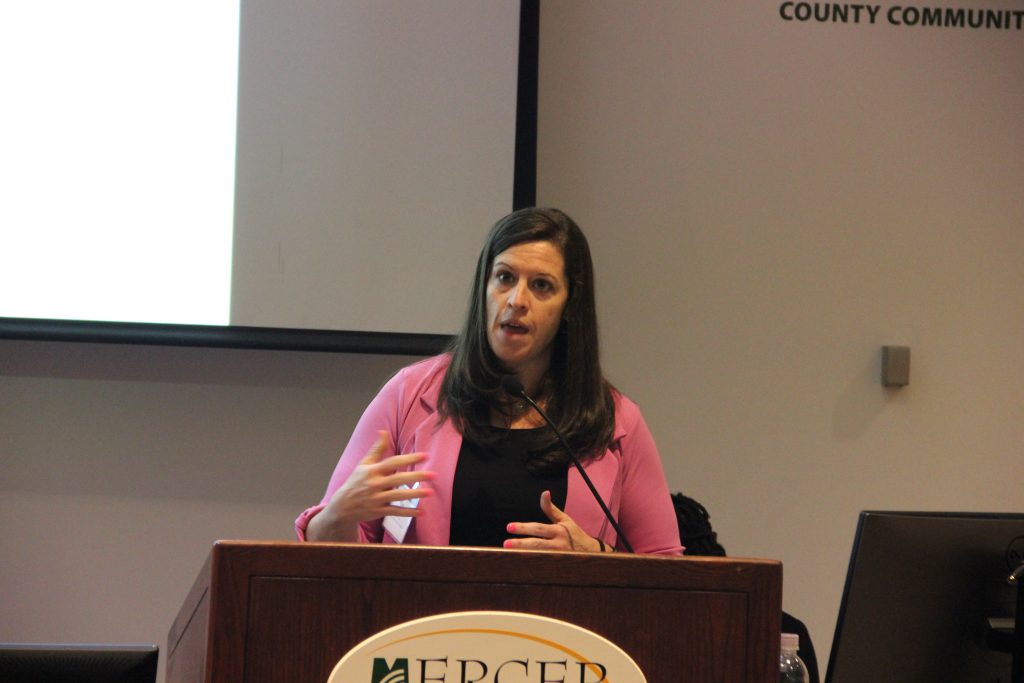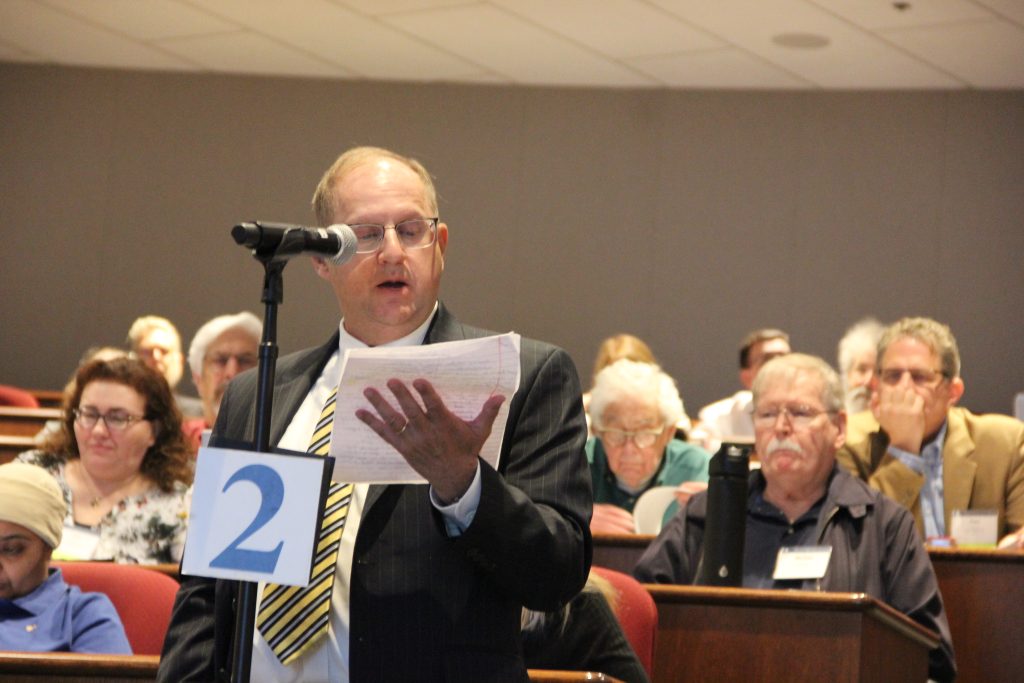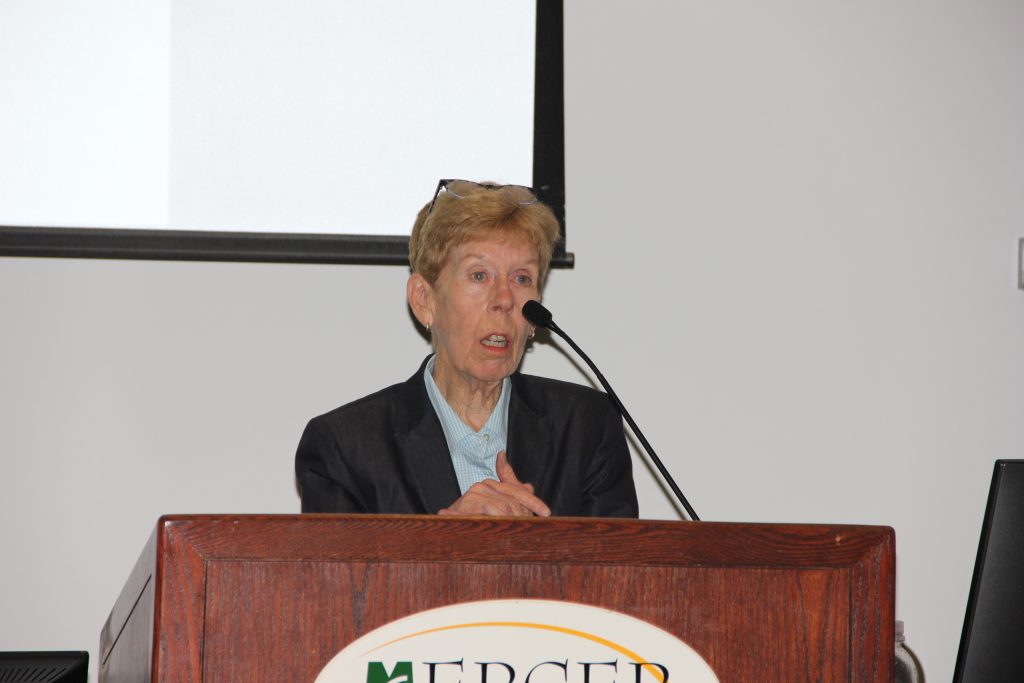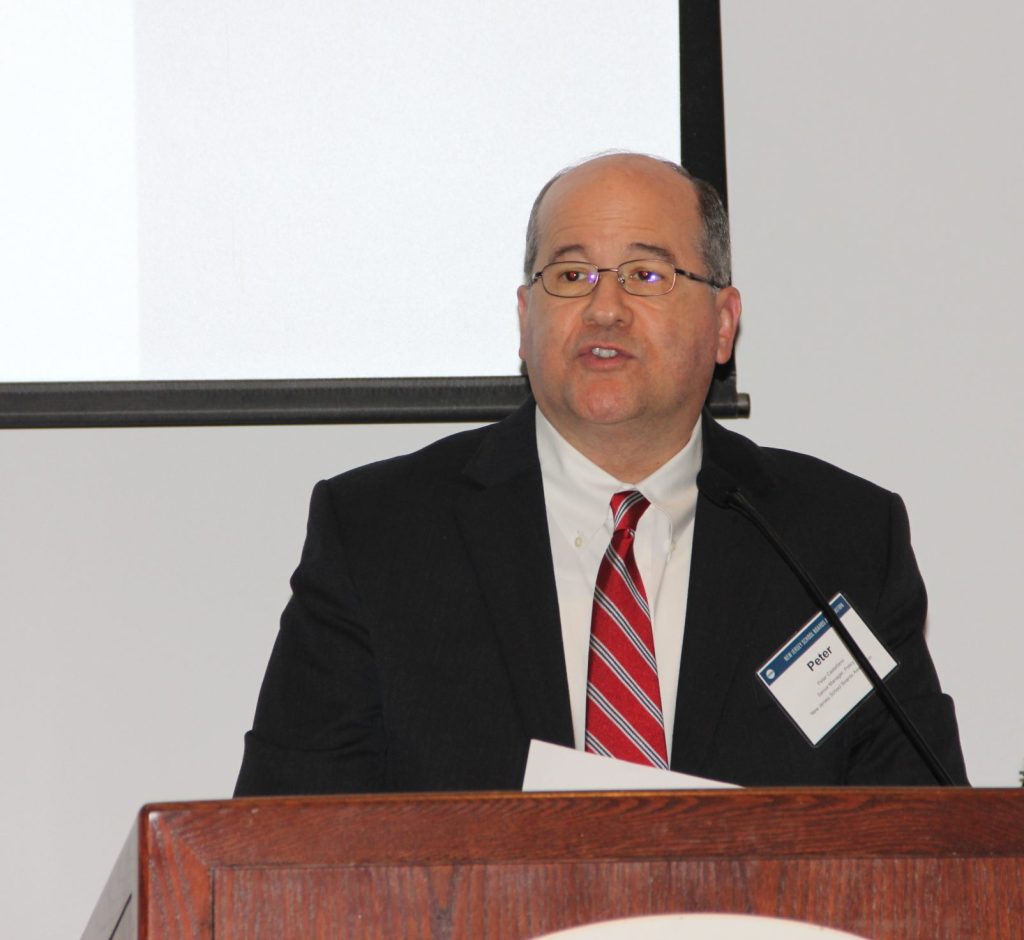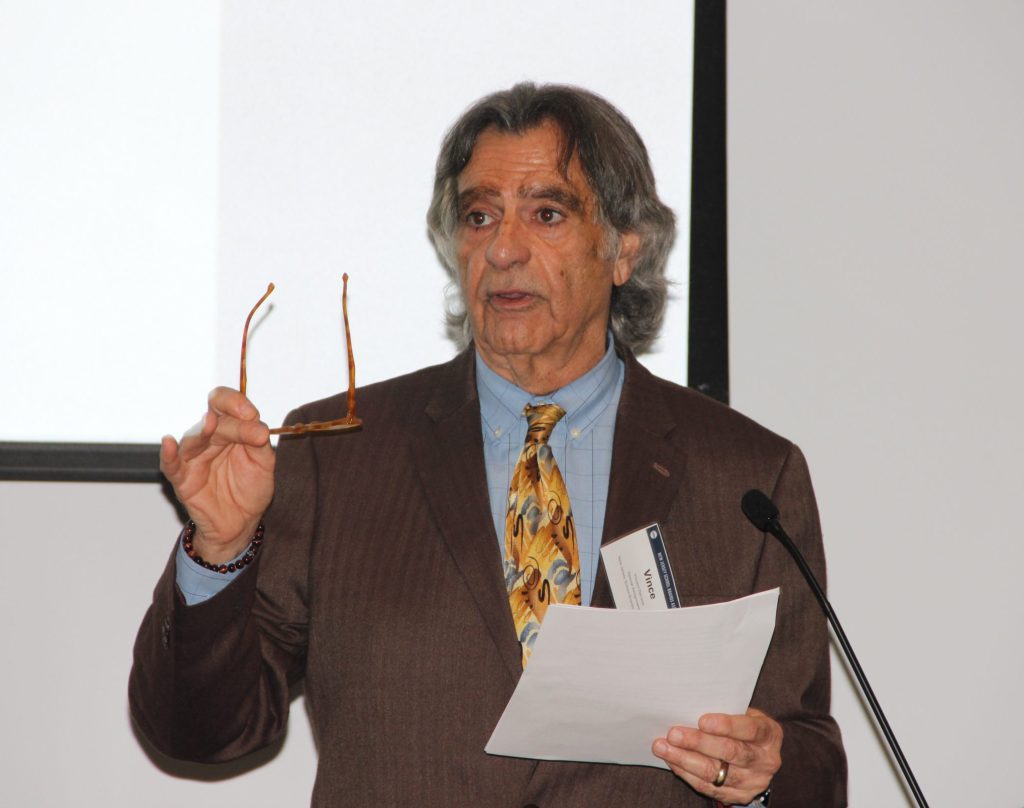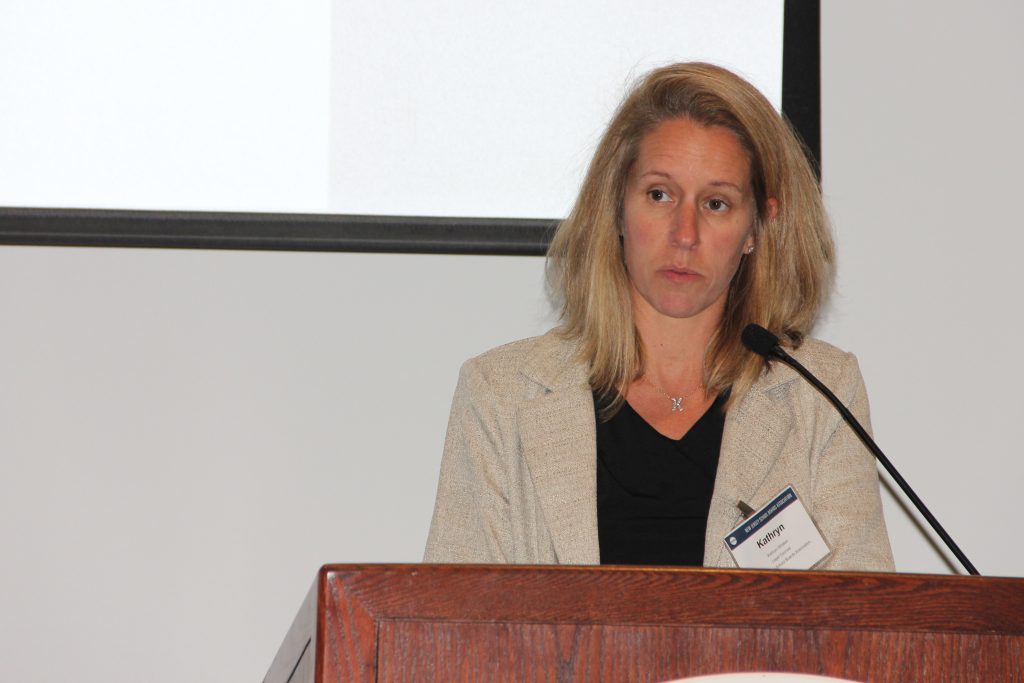It was a busy day at the New Jersey School Boards Association’s semiannual Delegate Assembly on May 18 at the Conference Center at Mercer in West Windsor, with delegates considering 14 resolutions.
Karen Cortellino, M.D., president of the Association, called the meeting to order and delivered opening remarks, updating delegates on the tremendous progress she’s achieved in reaching her goals as president, which include attending county meetings, refocusing on board member services and celebrating the services offered by the NJSBA.
“The past year has brought much growth for the Association,” she said. “Enthusiasm is at an all-time high. Transparency is award-winning. Innovation is encouraged and priorities are aligned with the mission. The Association’s culture is one of collaboration, leading to outstanding accomplishments.”
Dr. Timothy Purnell, executive director and CEO of the NJSBA, referred delegates to his full report that was made available to them in writing, noting that he wanted to keep his comments short to respect everyone’s time.
“These are extremely difficult times,” he said. “We are here to support you in your work. If there is something we can do better, reach out to us. I am available for coffee. I want to continue to support you, so you can support the children in your districts.”
Purnell introduced the Delegate Assembly’s new parliamentarian, David White, whose role is not to issue decisions or rulings but to advise the Association on parliamentary procedure.
Chanta L. Jackson, the NJSBA’s vice president for legislation/resolutions, oversaw the rest of the meeting as the delegates considered the resolutions. She noted that 15 resolutions were received by the deadline, and one was withdrawn in advance of the meeting.
Jackson invited a motion to reorder the motions to begin with those the Resolutions Subcommittee recommended not adopting. That motion was made and approved. The resolutions presented and the results are detailed below.
Resolution No. 4 – Special Education/Tuition Costs
The Plainfield Board of Education (Union County) proposed replacement policy language to NJSBA’s Manual of Positions and Polices on Education, File Code No. 6171.4 Special Education – Tuition Costs, providing that “NJSBA believes that there should be a 2% cap placed on the annual tuition increase imposed on school districts by approved public and private schools that charge tuition to educate students.” Additionally, Plainfield sought to remove the following language from the same File Code No. 6171.4, “public schools should receive fair consideration in determining their special education tuition rate.”
Kathleen Asher, director of legal and labor relations at the NJSBA, explained why the Resolutions Subcommittee recommended not adopting the resolution, noting that there is language that addresses the topic in a different section of the Manual of Positions and Policies on Education. The language is general to give the Association some flexibility when speaking to this issue on the advocacy front, she noted. It was unclear to the NJSBA whether the specific replacement language being recommended would benefit all districts, she said.
Result: The resolution failed.
Resolution No. 6 – Consideration of Resolutions
The Plainfield Board of Education (Union County) sought revised language for Article V, Section 4 titled “Consultation” of the NJSBA bylaws. The board proposed language that would provide for an interim process by which districts proposing resolutions deemed unclear or in improper form by NJSBA support staff or the Resolutions Subcommittee could revise those resolutions prior to the members of the Delegate Assembly deliberation and vote of any proposed resolutions during an annual or regular meeting.
Kimberly Gatti, director of policy at the NJSBA, explained why the Resolutions Subcommittee recommended rejecting the resolution, noting that the committee provides input to districts that submit resolutions deemed to be deficient, and that there is nothing in the NJSBA’s bylaws that prevent a district from resubmitting a resolution in its proper form if there is time to do so – or a district can resubmit the resolution in the proper format at the next Delegate Assembly. The resolution would be “unlikely to enhance the resolution process,” she said.
Result: The resolution failed.
Resolution No. 8 – Payment in Lieu of Taxes
The Toms River Board of Education (Ocean County) proposed revised language for NJSBA’s Manual of Positions and Policies on Education, File Code 3220, indicating that all real estate developments utilizing Payment in Lieu of Taxes programs should be included in any statewide equalized valuation calculation that impacts a local education agency’s share of state education aid and determines local fair share.
Charles Muller, the NJSBA’s business administrator in residence, explained to delegates why the Resolutions Subcommittee recommended voting against the resolution, noting that as presented, the resolution could have a negative impact on the 197 municipalities/districts that currently have PILOT programs.
Result: The resolution failed.
Resolution No. 10 – Mandatory Kindergarten
The Toms River Regional School District (Ocean County) proposed new policy language providing that “NJSBA believes full-day kindergarten should be a required grade in New Jersey Public Schools to help local education agencies facilitate instruction and mastery of the New Jersey Student Learning Standards, and this mandate should be supported through a well thought out school funding formula.”
Asher spoke on behalf of the NJSBA, explaining why the Resolutions Subcommittee recommended not adopting the resolution. She noted the Association’s current position is that full-day kindergarten should not be mandated unless fully funded by the state to meet the need for additional facilities and staff.
A motion was made to strike “full day” from the resolution’s description of kindergarten, which was approved.
Result: The resolution, as amended, passed.
Resolution No. 12 – State Aid
The Toms River Board of Education (Ocean County) sought to add additional language to NJSBA’s Manual of Positions and Policies on Education, File Code 3220, regarding the amount of state aid a school district receives. Specifically, the resolution stated that state aid should be frozen at the 2022-2023 levels for financially responsible S2 losers who are >10% below adequacy, spend at least 10% less than the average on administrative costs, and are unable to meet the local fair share contribution despite annual maximum statutory permitted tax levy increase until such time as the state aid formula is studied and thoughtful recommendations are made to facilitate a through and efficient education for all New Jersey public school students.
Muller spoke about why the Resolutions Subcommittee opposed the resolution. He noted that NJSBA policies currently address equitable funding issues, advocacy efforts continue and that there are legislative developments in progress.
Result: The resolution failed.
Resolution 13 – Inclusion of ‘Intent’ in HIB Cases
The Warren Hills Board of Education (Warren County) proposed additional policy concerning the inclusion of intent of the alleged perpetrator as an essential element of harassment, intimidation and bullying.
John Burns, senior legislative counsel at the NJSBA, explained why the Resolutions Subcommittee recommended voting against the resolution.
There was a motion to amend the resolution, so it stated school districts “may” consider intent instead of always considering intent. The amended language was adopted, but it prompted a flurry of debate among delegates, some of whom voiced concerns about the arbitrary nature of the word “may” and others who expressed concern about the rights and safety of victims.
Result: The resolution as amended was referred to a committee.
Next, the delegates considered various resolutions that the Resolutions Subcommittee recommended approving.
Resolution No. 1- Award Limit on Litigation
The Clinton Township Board of Education (Hunterdon County) proposed new policy language supporting the belief that the state should establish a funded award limit for litigation that is difficult to defend due to an extended statute of limitations and school districts’ limited access to documentation. The resolution asserted that lawsuits arising from the extended statute of limitations have already led to increased costs in defending the claims. The resolution also anticipated that the district would have to use local tax dollars to pay the court awards and/or settlement agreements resulting from the litigation, which would impede the district’s ability to provide a thorough and efficient education.
The Resolutions Subcommittee recommended approving the resolution with the following substitute language, “The NJSBA believes that, although the Child Sexual Abuse Act permits civil claims against public entities, due to the expanded statute of limitations to bring such actions, there may be situations where a school district is unable to properly defend a specific claim due to the passage of time, which then leads to protracted litigation and associated costs that negatively impact a district’s ability to provide a thorough and efficient education. If such circumstances are demonstrated, the state should provide assistance, including, but not limited to, financial support, to ensure that school districts maintain sufficient resources to provide a thorough and efficient education to all students.”
Caitlin Pletcher, legal counsel of the NJSBA, elaborated on why the Resolutions Subcommittee recommended approving the resolution as it was reworded.
Result: The resolution as presented was approved.
Resolution No. 2 – Capital Reserve Accounts
The Denville Board of Education (Morris County) proposed new policy giving boards of education the authority to use their capital reserve accounts as a source of funds for the purchase of school buses, particularly electric school buses.
The Resolutions Subcommittee recommended adopting the resolution with the following substitute resolve clause for inclusion in NJSBA’s Manual of Positions and Policies on Education: “The NJSBA believes that school districts should be permitted to use monies from the capital reserve account to purchase school vehicles, including electric school buses and related infrastructure, such as charging stations.”
Burns spoke on behalf of the Association, explaining why the Resolutions Subcommittee recommended approving the resolution as reworded.
Result: The resolution as presented was approved.
Resolution No. 3 – School Cancellations
The Plainfield Board of Education (Union County) sought to supplement File Code 6114 (Emergencies and Disaster Preparedness) in the NJSBA’s Manual of Positions and Policies on Education, under the subheading, “School Cancellations,” with additional policy language broadening its scope. More specifically, the resolution sought to enumerate virtual or remote instruction as an “option” that should be available to local boards of education in lieu of closing their schools in certain situations. Additionally, the proposed resolution sought to have this option available for “up to 10%” of a local board of education’s school days, and “as needed for weather-related issues, unsafe increases in COVID-19 locally, and other emergencies.”
The Resolutions Subcommittee recommended approving the proposed resolution with the following substitute language, “The NJSBA believes that the opening and closing of public schools is a matter best determined by local boards of education. State government, including but not limited to the State Board of Education, should not mandate the closing of public schools except for state holidays, or reasons of health and public safety. Options in lieu of closing should be provided to local boards of education that can be adapted to meet local conditions, including, but not limited to, the use of 10 virtual or remote instruction days to satisfy the required number of days of instruction.”
Kathryn A. Whalen, legal counsel/human resources at the NJSBA, explained why the Resolutions Subcommittee adjusted the language, explaining that the committee believed that virtual or remote instruction should be allowed to count toward 180 days of instruction without risking a loss of state aid.
Result: The resolution as presented was approved.
Resolution No. 5 – Dual Language Immersion Programs
The Plainfield Board of Education (Union County) sought to supplement File Code 6142.2 (English Language Learner; Bilingual/Bicultural) in the Manual of Positions and Policies on Education, under the subheading “Programs,” subsection B. More specifically, the resolution sought to include additional language providing local boards of education with “a more flexible approach” to establish dual-language immersion programs other than utilizing a numerical proportional cap for classes. Stated differently, the resolution sought to provide local boards of education with more flexibility in the proportion of multilingual learners to English speaking students in dual-language immersion programs.
The Resolutions Subcommittee recommended approving the proposed resolution with the following substitute language, “The NJSBA believes that local boards of education should have flexibility in implementing alternative instructional approaches when they are unable to implement a bilingual education program and, to the extent deemed educationally appropriate, should have flexibility in establishing dual-language immersion programs even if they are unable to strictly comply with regulatory requirements.”
Result: The resolution as presented was approved.
Resolution No. 7 – Use of Artificial Intelligence
The Plainfield Board of Education (Union County) sought to add new policy language to NJSBA’s Manual of Positions and Policies on Education 6142.10, Technology, indicating the belief that boards of education should implement policies that establish guidelines on the use of artificial intelligence in public schools.
The Resolution Subcommittee recommended adopting the resolution with the following substitute resolved clause, “The NJSBA believes that the use of Artificial Intelligence (AI) by students and staff, along with the integration of AI into curriculum, presents both unprecedented opportunities and profound challenges to New Jersey School Districts and that school districts need to implement policies to establish guidelines for the use of AI in public schools. In support of this belief, NJSBA supports the establishment of a statewide Artificial Intelligence Task Force, which will provide guidance and policy recommendations to assist public schools in ensuring equitable access to AI technologies, promote responsible and ethical AI use and foster innovation and digital literacy among students and educators.”
Result: The resolution as it was presented was approved.
Resolution No. 9 – Use of Schools as Polling Places
The Toms River Regional School District Board of Education (Ocean County) proposed new policy language at File Code 1400 supporting its belief that, in the interest of school security, the use of public school buildings for polling places while school is in session should be prohibited.
The Resolutions Subcommittee recommended approving the proposed resolution with the following substitute resolved clause: “The NJSBA believes the determination as to whether to close a public school building used as a polling place on an election day should be made by the local board of education.”
Peter Castellano, senior manager of policy at the NJSBA, explained the Association’s position, observing that in some communities, school buildings may be the best place to hold an election and that making it easy for citizens to vote promotes a well-functioning government. In addition, school districts already have the authority to close school, or schedule in-service days when students are not present on election days if they choose.
A motion was made to amend the reworded resolution to say “The NJSBA believes the determination whether to allow a public school building to be used as a polling place on an election day should be made by the local board of education.” That motion was approved.
Result: The resolution as it was amended was approved.
Resolution No. 11 – Database of State-Mandated Policies
The Toms River Board of Education (Ocean County) sought new policy language indicating that the NJSBA believes the New Jersey Department of Education should be required to maintain a public database of all state-mandated policies and issue model policy documents including all required language and areas of discretion in such model policies.
The Resolutions Subcommittee recommended approving the proposed resolution with the following substitute language, “The NJSBA believes that the role of the State Department of Education in approving local district policy should not exceed the requirements of administrative code or encroach on the authority of local boards of education regarding the management and operation of the district. Nevertheless, the State Department of Education should maintain a publicly available list of legislatively or regulatorily mandated policies that a local board of education is required to maintain as part of its policy manual. Sample or model policies may be provided as guidance for local boards but should not indicate any specific language is mandated.”
Result: The resolution as presented was approved.
Resolution No. 14 – History Instruction
The Wharton Borough Board of Education (Morris County) proposed additional policy language for adoption by the Delegate Assembly and inclusion in NJSBA’s Manual of Positions and Policies on Education, File Code 6142, Subject Fields, indicating the belief that history instruction should occur across all content areas, and provide students with a comprehensive, unbiased account of the world’s and our nation’s history, enabling them to make valid connections to the present and participate in the democratic processes that further advances the causes of justice, security and opportunity for all.
The Resolutions Subcommittee recommended approval of the resolution with the following wording: “The NJSBA believes that the teaching of history, across all content areas, should provide students with a comprehensive, unbiased account of the world’s and our nation’s history, enabling them to make valid connections to the present and to participate in democratic processes that further advance the causes of justice, security and opportunity for all.”
Vince DeLucia, special assignments at NJSBA spoke on behalf of NJSBA, observing that it is becoming increasingly important for students to have the ability to discern between facts and opinions.
Result: The resolution as presented was approved.
